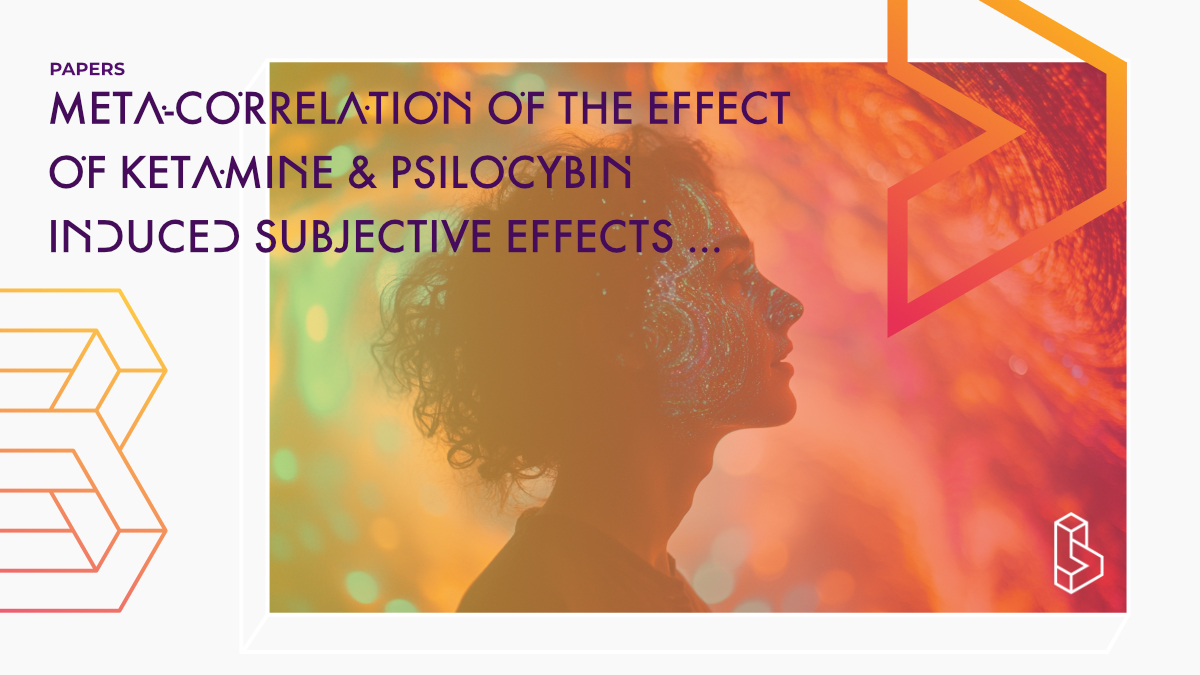This meta-analysis (2024, s=31) examines the correlation between subjective effects and therapeutic outcomes for ketamine (s=23, n=471) and psilocybin (s=8, n=183) in depression and substance use disorder (SUD) treatment. It finds modest mediating effects of subjective experiences on therapeutic outcomes, with psilocybin showing a stronger mediating effect (R²=24%) compared to ketamine (R²=5-10%), and a greater mediating effect observed in SUD compared to depression regardless of the substance used.
Abstract of Meta-correlation of the effect of ketamine and psilocybin induced subjective effects on therapeutic outcome
“There is some evidence that the subjective effects of ketamine and other psychedelics like psilocybin are crucial for their therapeutic outcomes, such as treatment of depression or substance use disorder (SUD). We performed a meta-analysis and systematic review on the correlation of subjective symptoms and dissociation versus ketamine-induced therapeutic outcomes in patients with depression or SUD. A similar analysis was conducted for psilocybin-induced therapeutic improvement. We retrieved 23 papers studying ketamine (21 on depression, 2 on SUD) in 471 patients and 8 papers studying psilocybin (6 on depression, 2 on SUD) in 183 patients. Our study demonstrated a modest role for subjective effects mediating therapeutic outcomes, with R2-values ranging from 5–10% for ketamine and for psilocybin the R2 was 24%. A greater mediating effect for psilocybin compared to ketamine was detected, particularly when restricting the analysis to depression. Additionally there is a greater mediating effect in SUD than depression, irrespective of treatment.“
Authors: Jack D. C. Dahan, David Dadiomov, Tijmen Bostoen & Albert Dahan
Summary of Meta-correlation of the effect of ketamine and psilocybin induced subjective effects on therapeutic outcome
Psychedelic compounds have gained attention for their potential in treating psychiatric conditions, as mainstream antidepressants often exhibit limited efficacy and delayed results. Psychedelics, which modulate consciousness, mood, and cognition, are categorized into “classical” and “non-classical” groups. Classical psychedelics, like psilocybin and LSD, act as serotonin receptor agonists, while non-classical substances, such as ketamine, esketamine, and MDMA, target other receptors like NMDA and dopamine. Despite their diverse targets, psychedelics share the ability to induce psychoplastogenic effects, promoting neuroplasticity and rewiring pathological brain circuits.
These neurotrophic effects are linked to meaningful subjective experiences reported by users, which are believed to contribute to their therapeutic potential. However, each psychedelic compound produces distinct conscious effects that vary between substances. The psychoplastogenic effects, combined with the meaningful subjective experiences, may drive their potential benefits in psychiatric therapy, suggesting that their impact goes beyond mere neurochemical changes to affect deeper cognitive processes.
Interest in psychedelics for clinical use has risen, especially in treating conditions like therapy-resistant depression, anxiety, PTSD, substance use disorders, and chronic pain. A landmark event in this field was the FDA’s approval of intranasal esketamine in 2019 for depression, highlighting the increasing recognition of these compounds in modern psychiatry and pain management.
Methods
Find this paper
https://doi.org/10.1038/s44184-024-00091-w
Open Access | Google Scholar | Backup | 🕊
Cite this paper (APA)
Dahan, J. D. C., Dadiomov, D., Bostoen, T., & Dahan, A. (2024). Meta-correlation of the effect of ketamine and psilocybin induced subjective effects on therapeutic outcome. npj Mental Health Research, 3, 45. https://doi.org/10.1038/s44184-024-00091-w
Study details
Compounds studied
Ketamine
Psilocybin
Topics studied
Depression
Addiction
Study characteristics
Meta-Analysis
Literature Review
Participants
654
Humans

